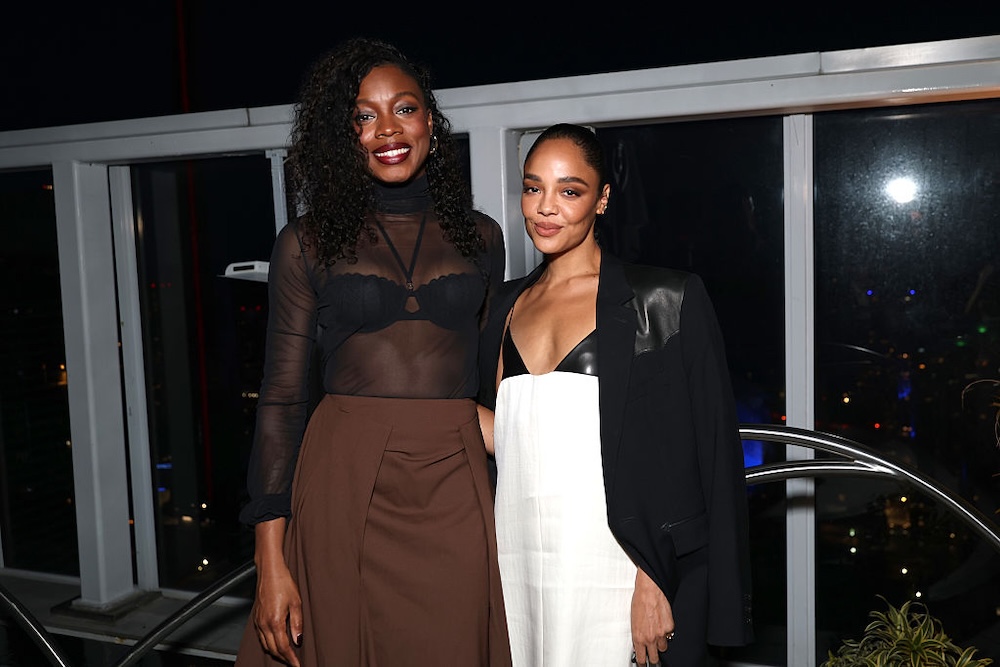
In Amazon Prime’s new romantic drama Hedda, Tessa Thompson and Nia DaCosta flaunt synergy like great actor-director partnerships: Denzel Washington and Spike Lee; Ryan Coogler and Michael B. Jordan. But the Thompson-DaCosta team-up marks practically the first of its kind for Black female creatives in Hollywood: from DaCosta’s debut feature starring Thompson, Little Woods, to Thompson’s Valkyrie cameo in DaCosta’s Marvel Studios moment, The Marvels.
Hedda, adapted from a 19th-century play of Henrik Ibsen, revolves around crazymaker dynamo Hedda Gabler, who wreaks havoc at her mansion-sized house party between her husband, former lover Eileen Lovborg (an Oscar-worthy Nina Hoss), her lover, Thea (Imogen Poots) and the unscrupulous Judge Roland Brack (The Book of Clarence’s Nicholas Pinnock).
Nia DaCosta—who wrote, produced and directed the film—recently broke bread with EBONY in midtown Manhattan to discuss Hedda’s motivations, its themes of bravery, cowardice and characters listening to their darker angels.
EBONY: Screenwriting 101 teaches “what do your characters want.” What would you say Hedda Gabler wants in the course of Hedda? Is she out to cause chaos? Does she want to shape people’s destiny?
Nia DaCosta: I think Hedda wants to be free. I think all of us want to be free, but we’re really scared sometimes to actually do that. Which is why we kind of think, “oh, I need power. That’s how I’ll be free.” The power does not guarantee freedom. In fact, if you need power to be free, then it kind of defeats the purpose. I think all of the characters are dealing with that tension.
But I also think that Hedda wants to be loved so deeply, and she wants to live—really live. But this movie is about the confines that people are butting up against and what that turns into and how, for Hedda especially, it makes her animals come out, which she wants for everyone else. You really feel that struggle.
How did you first discover Henryk Ibsen’s play, and what made it interesting for you to adapt?
I was getting my master’s in London [at the Royal Central School of Speech and Drama], following all the theater and reading plays, and one of the plays we read was an Ibsen play. And then I started to explore the rest of his work and Hedda. And I thought, “wow… this is amazing.” I was so compelled by it. I kept thinking about it and then eventually realized I wanted to make it my own.
What is heavy breath meant to represent in the film? Is that Hedda’s mischievous spirit coming out, or when she decides to listen to her darker angels?
Well, it was an element that I wanted to be very, very close to Hedda, to her psyche. All the musical aspects of the movie, all the score elements, are different parts of her. And I think that the breath is sort of that constant thing that pulls us through the story. Sometimes it’s about, “oh, no, here we go.” [laughter] Sometimes it’s also a relief. We have different types of breath as well. But they’re not meant to be like a one-for-one [device] necessarily.
There’s a lot of language in Hedda about who’s being brave, who’s being a coward and who has courage. Hedda says such things like it’s a taunting sometimes. What point is the film making about these themes?
I think it’s asking us to really think about, What is bravery? What is cowardice? Is Hedda a coward for trying to define safety? Is Eileen brave for trying to attain power by forcing her way into this place that doesn’t want her? I think, in ways, Thea is the bravest person because she takes one of the biggest risks. She’s like, “I wanna do what I want, no matter what anyone thinks.” Eileen really cares what people think, and Hedda absolutely cares what people think. For me, those discussions are getting the audience to think, what is bravery, what is cowardice and what is freedom.
Hedda is now playing on Prime Video.